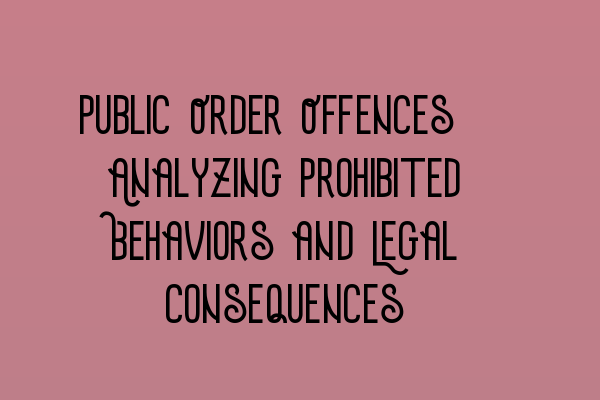Public Order Offences: Analyzing Prohibited Behaviors and Legal Consequences
Welcome to the SQE Criminal Law & Practice Law UK blog, where we provide expert insights and advice on various legal topics. In this article, we will delve into the world of public order offences, examining the prohibited behaviors and the legal consequences associated with them.
Understanding Public Order Offences
Public order offences encompass a range of behaviors that disrupt or disturb public peace and order. These offences are typically committed in public spaces and often involve a breach of the peace, causing fear, harassment, or distress to individuals within the vicinity.
Examples of common public order offences include:
- Disorderly Conduct: This involves engaging in aggressive, threatening, or violent behavior that causes public alarm or nuisance.
- Affray: Characterized by the use or threat of unlawful violence, which causes others to fear for their safety.
- Violent Disorder: Occurs when three or more individuals use or threaten violence to intentionally cause fear or provoke an outbreak of violence.
- Public Nuisance: Conduct that interferes with the public’s rights or endangers the safety, convenience, or comfort of others.
- Riot: Involves a disturbance of the peace by a group of people, resulting in violence, damage to property, or the imminent threat of such actions.
Legal Consequences
Public order offences can have serious legal ramifications. Upon conviction, individuals may face penalties such as fines, community service, injunctions, or even imprisonment depending on the severity of the offense.
It is important to seek legal representation if you have been accused of a public order offence. A qualified criminal law solicitor can provide the necessary guidance and build a robust defense strategy tailored to your specific circumstances.
Defending Against Public Order Offences
When facing charges for a public order offence, it is crucial to have a skilled solicitor by your side to help you navigate the complexities of the legal system. Some potential defenses to consider include:
- Proving lack of intent or knowledge of the alleged offense.
- Establishing self-defense or acting in defense of others.
- Challenging the credibility of witnesses or evidence presented by the prosecution.
- Demonstrating that your actions were reasonable and proportionate under the circumstances.
Each case is unique, and the best defense strategy will depend on the specific details and evidence involved. It is crucial to consult with an experienced solicitor who specializes in criminal law to increase your chances of a successful defense.
Contact SQE Criminal Law & Practice Law UK
If you require legal assistance or advice related to public order offences, our team at SQE Criminal Law & Practice Law UK is here to help. We offer comprehensive legal services tailored to our clients’ needs while ensuring the highest standards of professionalism and expertise.
For more information on our SQE 2 Preparation Courses or SQE 1 Preparation Courses, please visit our website. Stay updated with the latest SRA SQE Exam Dates for your planning and preparation.
If you have specific questions or require immediate legal assistance, please do not hesitate to contact us at SQE Criminal Law & Practice Law UK. Our team of experienced solicitors is ready to assist you in defending your rights and achieving a favorable outcome.
